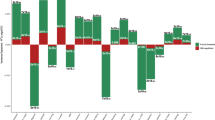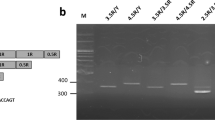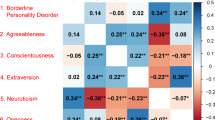Abstract
Estrogens are known to play a key role in the regulation of various aspects of behavior. In order to study the potential contribution of genetic variation in the estrogen receptor (ER) alpha to specific personality traits, we investigated a repeat polymorphism in the ER alpha gene in 172 42-year-old women who had been assessed using the Karolinska Scales of Personality (KSP). Based on the hypothesis that there is a relationship between the length of a repeat polymorphism and gene function,1 the alleles were divided into two groups: short and long. In order to elucidate the possible influence of the ER alpha gene on the different aspects of personality measured by means of the KSP, the possible association between this gene and four different factors (‘neuroticism’, ‘psychoticism’, ‘non-conformity’, and ‘extraversion’) was analysed. ‘Neuroticism’, ‘psychoticism’, and ‘non-conformity’ all appeared to be associated with the ER alpha gene. After correction for multiple comparisons by means of permutation analysis, the associations with the factor ‘non-conformity’—including the subscales ‘indirect aggression’ and ‘irritability’—and the factor ‘psychoticism’—including the subscale ‘suspicion’—remained significant. The results suggest that the studied dinucleotide repeat polymorphism of the ER alpha gene may contribute to specific components of personality.
This is a preview of subscription content, access via your institution
Access options
Subscribe to this journal
Receive 12 print issues and online access
$259.00 per year
only $21.58 per issue
Buy this article
- Purchase on Springer Link
- Instant access to full article PDF
Prices may be subject to local taxes which are calculated during checkout

Similar content being viewed by others
References
Comings DE . Polygenic inheritance and micro/minisatellites. Mol Psychiatry 1998; 3: 21–31.
Gustavsson JP, Pedersen NL, Asberg M, Schalling D . Origins of individual differences in anxiety proneness: a twin/adoption study of the anxiety-related scales from the Karolinska Scales of Personality (KSP). Acta Psychiatr Scand 1996; 93: 460–469.
Cloninger CR, Van Eerdewegh P, Goate A, Edenberg HJ, Blangero J, Hesselbrock V et al. Anxiety proneness linked to epistatic loci in genome scan of human personality traits. Am J Med Genet 1998; 81: 313–317.
Benjamin J, Ebstein RP, Lesch KP . Genes for personality traits: implications for psychopathology. Int J Neuropsychopharmacol 1998; 1: 153–168.
Damberg M, Garpenstrand H, Hallman J, Oreland L . Genetic mechanisms of behavior—don't forget about the transcription factors. Mol Psychiatry 2001; 6: 503–510.
McEwen BS . Invited review: estrogens effects on the brain: multiple sites and molecular mechanisms. J Appl Physiol 2001; 91: 2785–2801.
Rubinow DR, Schmidt PJ, Roca CA . Estrogen—serotonin interactions: implications for affective regulation. Biol Psychiatry 1998; 44: 839–850.
Steiner M . Female-specific mood disorders. Clin Obstet Gynecol 1992; 35: 599–611.
van Amelsvoort T, Compton J, Murphy D . In vivo assessment of the effects of estrogen on human brain. Trends Endocrinol Metab 2001; 12: 273–276.
Yonkers KA, Bradshaw KD, Halbreich U . Oestrogens, progestins and mood. In: Steiner M, Yonkers KA, Eriksson E. (eds). Mood Disorders in Women. Martin Dunitz: London, 2000, pp 207–232.
Osterlund MK, Hurd YL . Estrogen receptors in the human forebrain and the relation to neuropsychiatric disorders. Prog Neurobiol 2001; 64: 251–267.
Ogawa S, Eng V, Taylor J, Lubahn DB, Korach KS, Pfaff DW . Roles of estrogen receptor-alpha gene expression in reproduction-related behaviors in female mice. Endocrinology 1998; 139: 5070–5081.
Ogawa S, Lubahn DB, Korach KS, Pfaff DW . Behavioral effects of estrogen receptor gene disruption in male mice. Proc Natl Acad Sci USA 1997; 94: 1476–1481.
Rissman EF, Wersinger SR, Fugger HN, Foster TC . Sex with knockout models: behavioral studies of estrogen receptor alpha. Brain Res 1999; 835: 80–90.
Kunnas TA, Laippala P, Penttila A, Lehtimaki T, Karhunen PJ . Association of polymorphism of human alpha oestrogen receptor gene with coronary artery disease in men: a necropsy study. BMJ 2000; 321: 273–274.
Becherini L, Gennari L, Masi L, Mansani R, Massart F, Morelli A et al. Evidence of a linkage disequilibrium between polymorphisms in the human estrogen receptor alpha gene and their relationship to bone mass variation in postmenopausal Italian women. Hum Mol Genet 2000; 9: 2043–2050.
Georgiou I, Syrrou M, Bouba I, Dalkalitsis N, Paschopoulos M, Navrozoglou I et al. Association of estrogen receptor gene polymorphisms with endometriosis. Fertil Steril 1999; 72: 164–166.
Comings DE, Muhleman D, Johnson P, MacMurray JP . Potential role of the estrogen receptor gene (ESR1) in anxiety. Mol Psychiatry 1999; 4: 374–377.
Comings DE, Gade-Andavolu R, Gonzalez N, Wu S, Muhleman D, Blake H et al. A multivariate analysis of 59 candidate genes in personality traits: the temperament and character inventory. Clin Genet 2000; 58: 375–385.
Comings DE, Gade-Andavolu R, Gonzalez N, Wu S, Muhleman D, Blake H et al. Multivariate analysis of associations of 42 genes in ADHD, ODD and conduct disorder. Clin Genet 2000; 58: 31–40.
Prichard Z, Jorm AF, Prior M, Sanson A, Smart D, Zhang Y et al. Association of polymorphisms of the estrogen receptor gene with anxiety-related traits in children and adolescents: a longitudinal study. Am J Med Genet 2002; 114: 169–176.
Nilsson J . Which Genes are Involved?—Statistical Planning and Analysis of Human Genetic Samples. Chalmers University of Technology: Sweden, 2001.
Westfall P, Young S . Resampling-Based Multiple Testing: Examples and Methods for p-Value Adjustment. John Wiley and Sons: New York, 1993.
Albert DJ, Jonik RH, Walsh ML . Hormone-dependent aggression in male and female rats: experiential, hormonal, and neural foundations. Neurosci Biobehav Rev 1992; 16: 177–192.
Finkelstein JW, Susman EJ, Chinchilli VM, Kunselman SJ, D'Arcangelo MR, Schwab J et al. Estrogen or testosterone increases self-reported aggressive behaviors in hypogonadal adolescents. J Clin Endocrinol Metab 1997; 82: 2433–2438.
Kyomen HH, Satlin A, Hennen J, Wei JY . Estrogen therapy and aggressive behavior in elderly patients with moderate-to-severe dementia: results from a short-term, randomized, double-blind trial. Am J Geriatr Psychiatry 1999; 7: 339–348.
Schmidt PJ, Nieman LK, Danaceau MA, Adams LF, Rubinow DR . Differential behavioral effects of gonadal steroids in women with and in those without premenstrual syndrome. N Engl J Med 1998; 338: 209–216.
Rothenburg S, Koch-Nolte F, Rich A, Haag F . A polymorphic dinucleotide repeat in the rat nucleolin gene forms Z-DNA and inhibits promoter activity. Proc Natl Acad Sci USA 2001; 98: 8985–8990.
Rosmond R, Björntorp P . Psychiatric ill-health of women and its relationship to obesity and body fat distribution. Obes Res 1998; 6: 338–345.
Schalling D, Asberg M, Edman G, Oreland L . Markers for vulnerability to psychopathology: temperament traits associated with platelet MAO activity. Acta Psychiatr Scand 1987; 76: 172–182.
Jonsson EG, von Gertten C, Gustavsson JP, Yuan QP, Lindblad-Toh K, Forslund K et al. Androgen receptor trinucleotide repeat polymorphism and personality traits. Psychiatr Genet 2001; 11: 19–23.
Ekselius L, Gustavsson JP . Personality traits predicting treatment response in depressed patients treated with SSRIs. In: Association of European Psychiatrists (AEP) 10th Congress, Prague: Czech Republic, 2000.
Gustavsson JP, Weinryb RM, Goransson S, Pedersen NL, Asberg M . Stability and predictive ability of personality traits across 9 years. Person Individ Diff 1997; 22: 783–791.
Acknowledgements
This study was supported by grants from the Swedish Medical Research Council (Grants No. 8668 and 251), Lundberg's Foundation, Wallenberg's Foundation, Thuring's Foundation, and Lundbeck's Foundation. We thank Dr Lisa Ekselius and J Petter Gustavsson for valuable comments regarding the Karolinska Scales of Personality, and Inger Oscarsson, Gunilla Bourghardt, and Anna Nilsson for skillful technical assistance.
Author information
Authors and Affiliations
Corresponding author
Rights and permissions
About this article
Cite this article
Westberg, L., Melke, J., Landén, M. et al. Association between a dinucleotide repeat polymorphism of the estrogen receptor alpha gene and personality traits in women. Mol Psychiatry 8, 118–122 (2003). https://doi.org/10.1038/sj.mp.4001192
Received:
Revised:
Accepted:
Published:
Issue Date:
DOI: https://doi.org/10.1038/sj.mp.4001192
Keywords
This article is cited by
-
Hyaluronan–binding protein 2 (HABP2) gene variation in women with recurrent miscarriage
BMC Women's Health (2018)
-
Ambiguity aversion and familiarity bias: Evidence from behavioral and gene association studies
Journal of Risk and Uncertainty (2012)
-
Genetic determinants of aggression and impulsivity in humans
Journal of Applied Genetics (2012)
-
Estrogen receptor α gene polymorphisms and anxiety disorder in an elderly population
Molecular Psychiatry (2005)
-
Association between equine temperament and polymorphisms in dopamine D4 receptor gene
Mammalian Genome (2005)



